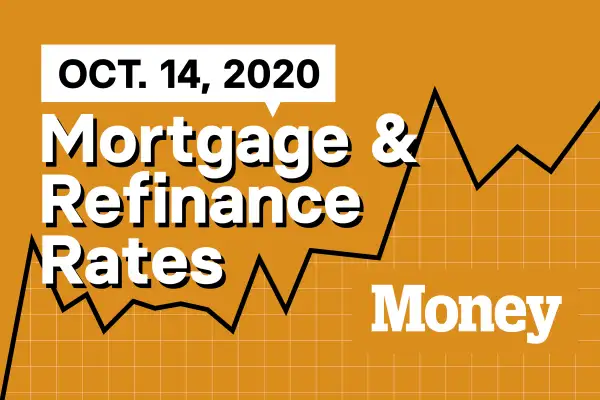Here Are Today's Best Mortgage & Refinance Rates for October 14, 2020

The average rate for a 30-year fixed-rate purchase mortgage was 3.513% on Tuesday. The average rate for a 30-year refinance was 4.356%.
Money's current mortgage rates include data from over 8,000 lenders across the United States and are updated daily. The rates include points and represent what a borrower with a 20% down payment and 700 credit scores — roughly the national average FICO score — would have been quoted.
| 30-year fixed-rate purchase mortgage |
| 3.513% |
| Rate of October 13, 2020 |
Mortgage rates vary from state to state. On Tuesday, borrowers in Illinois were quoted the lowest mortgage rates — at 3.31%. People looking for mortgages in Nevada saw the highest average rate at 3.774%. Nationwide, borrowers with the highest credit scores, 740 and above, were quoted rates averaging 3.021%, while those with credit of 640 or below were shown rates of 4.736% — a 1.715 percentage-point spread.
You may be able to negotiate a lower rate if you shop around or if you have other accounts with the lender. (Money's picks for the best mortgage lenders are here.) Currently, some banks are hiking up advertised rates to keep demand in check, so you may be offered a lower rate if you reach out directly.
Freddie Mac's widely quoted Primary Mortgage Market Survey put rates at 2.87% with 0.8 points paid for the week ending October 8. The mortgage purchaser's weekly survey reflects borrowers who put 20% down on conforming loans and have excellent credit.
Refinance rates today
Money's survey also shows that the offered rate for a 30-year refinance for someone with a 740 credit score was 3.737% on Tuesday. Last October, the average mortgage rate (including fees) was 3.859%.
| 30-year fixed-rate mortgage refi |
| 3.737% |
| Rate of October 13, 2020 |
A homeowner with a $200,000 mortgage balance currently paying 3.859% on a 30-year could potentially cut their monthly payment from $939 to $925 by financing at the current lower rates. To determine if it's worth it to refinance your mortgage, also consider the closing fees you paid on your current mortgage, how much your new lender is charging and how long you have left on your loan term. (Our picks for the best lenders for refinancing are here).
What else is happening in the housing market right now?
Mortgage loan applications ticked down 0.7% for the week ending October 9, according to the Mortgage Bankers Association. Purchase loans decreased by 1% but were still 24% higher than the same time last year. Refinance loans dipped by 0.3% although applications remained 44% higher year-over-year and accounted for 65.6% of all mortgage loan applications.
"Refinance and purchase activity continue to run well ahead of last year's pace, fueled by record-low rates and strong homebuyer demand," said Joel Kan, associate vice president of economic and industry forecasting for the MBA. "Housing supply is a challenge for many aspiring buyers, but activity should continue to stay strong the rest of the year."
The number of mortgage delinquencies — loans 30 days or more past due — spiked during the month of July, with serious delinquencies — 90 or more past due — reaching their highest level since April 2014, according to a report by real estate data provider CoreLogic.
Nationally, 6.6% of all mortgages were in some stage of delinquency, including foreclosure, representing a 2.8 percentage point increase over July of 2019, when the number of loans in trouble was 3.8%.
"Many Americans, particularly millennials, are taking advantage of low rates to either purchase their first home or upgrade their living situations,” said Frank Martell, CEO of CoreLogic. “However, given the unsteadiness of the job market, many homeowners are beginning to feel the compounding pressures of unstable income and debt on personal savings buffers, creating heightened risk of falling behind on their mortgages."
The share of loans that were 90 days or more past due, including loans in foreclosure, was 4.1%. Up from 1.3% in 2019. However, the share of loans in other stages of delinquencies either declined or held steady. Loans that were in the early stages of delinquency ticked down to 1.5% compared to 1.8% last July, and down from the high of 4.2% in April. Loans that were 60 to 89 days past due decreased from 2% of all loans in May to 1% in July.
Meanwhile, the share of mortgage loans in some stage of the foreclosure procedure was 0.3%, the lowest rate for any month in 21 years. Last July, the rate was 0.4%. The low foreclosure rate is likely due to the forbearance plans that temporarily halted these proceedings.
Quote of the Week
It feels like there is no way we can compete in this market," says Kyle Sutton, a buyer looking to purchase a home since April. "As terrible as it would be for so many people across the country, we're hoping for a massive drop in the housing market soon - or for us to win the lotto, which seems just as likely as winning a bid on a house right now."
For more on the housing market, read: The Home Buyer's Dilemma: As Mortgage Rates Fall, House Prices Soar Out of Reach.
Bottom line:
The Home Buyer's Dilemma: As Mortgage Rates Fall, House Prices Soar out of Reach
Buying Mortgage Points Can Lower Your House Payments. But What the Heck Are They?
